As your resident guitar expert, David Garcia, my journey from an engineer to a passionate guitar-maker has led me to an intriguing revelation. I had heard of wenge guitar necks, but it wasn’t until I held one in my hands – feeling the solidity of the wood and appreciating its deep chocolate hue – that I fully understood their appeal. This little-known tonewood completely transformed my understanding of guitar construction, leading me on a journey to discover its unique properties and potential.
Did you know, for instance, that wenge wood is denser than both maple and mahogany? This density has a significant impact on the tone and stability of a guitar neck, a key consideration in any luthier’s design process. However, I’m only scratching the surface of wenge’s intriguing nature – we have yet to probe into the soul of its sound and compare it to more well-known alternatives.
As I recount the story of my exploration into the world of wenge guitar necks, I invite you to join me. Whether you’re a fellow luthier, a guitar enthusiast, or simply sparked by curiosity, prepare for a deep dive into the wonders of wenge, exploring its impact on a guitar’s tone, ergonomics, and aesthetics along with comparisons to other beloved tonewoods.
What are Wenge Guitar Necks
Wenge Wood Properties
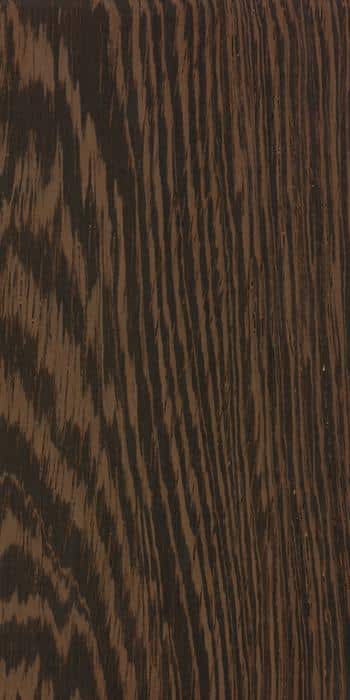
Delving deeper into the specifics of what makes wenge so integral to quality guitar necks, it’s vital to understand the unique wenge wood properties. Being both heavy and dense, wenge is incredibly robust offering reliable, stellar performance. The fine texture and straight grain structure give wenge an inherently smooth feel, making it a popular choice for guitar necks. These two factors, combined with its natural oils, give wenge an advantage: a high resistance to wear and tear. In my experience, this greatly contributes to the overall durability of wenge guitar necks.
What really underlines the superiority of wenge, however, is its tonal quality. The hardness of the wood makes it an excellent conduit for string vibration, enhancing the clarity of each note you play. Based on my personal experiences and in-depth research, the longevity and distinct tonal advantage that a wenge guitar neck provides, indeed contribute to a significantly extended lifespan and increased value of any guitar.
Wenge Neck Stability
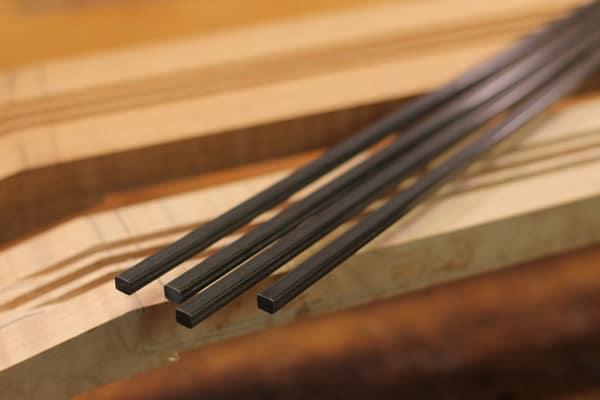
In my journey through the world of custom guitar necks, one standout is the wenge neck stability. I’ve found that this beautiful, uniquely patterned wood doesn’t just offer rich tonality, but also unparalleled stability. For a guitarist, this is invaluable. A stable neck holds its shape,
resists warping and needs fewer adjustments over time. This results in superior playability, tuning consistency and a prolonged neck lifespan.
In my hands-on experience, the density and oil content of wenge contribute to its stability, setting it apart from other woods. It’s something I notice each time I play, as the guitar neck feels firm, grounded and comfortable. Stability is not just about strength, but about how the guitar feels as a musical tool. I can say with assurance that wenge delivers on both fronts, making it an excellent choice for those seeking both aesthetic appeal and dependable performance.
Why Choose Wenge Guitar Necks
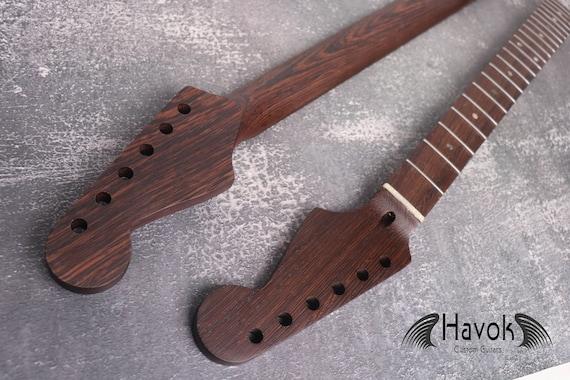
In the vast world of luthiery, the selection of material is as pivotal as the crafting methods, each decision impacting the essence of the instrument. My journey in instrument making has led me to appreciate the fine balance instrumental in the material selection. Here, I shed light on why wenge captures my attention.
A wenge neck undeniably stands out in terms of aesthetics. The dark lines coursing through the coffee brown colour of the wood strip down to lustrous black under the workshop lights, creating a visual spectacle. Each neck I’ve formed from this African timber carries those earnest grains, embedding a solemn echo of the wilderness in your guitar.
But why would a seasoned luthier favor a wenge neck over others? This intriguing answer may forever change your perspective on guitar crafting. Beyond its visual enchantment, the wenge neck tone brings a unique blend of richness and clarity to the harmonics. Rarely do you find a wood species that offers such tonal balance between the bass, mid, and treble frequencies.
Wenge’s weight presents another compelling component. While wenge is heavier than other woods, it does not sacrifice comfort for density. The wenge neck feel constructs an intimacy between the guitarist and the tone. A direct translation of striking vibration to your hand, every note resonates with a certain warmth, a certain familiarity.
The use of wenge for guitar building is not about chasing trends or making a statement. It’s about unleashing the unbound freedom of expression that the right wooden neck can unshackle. Wenge, with its unique aesthetic appeal and unmatched tonal balance, pairs with the craftiness of skilled hands to form an instrument as much an art piece as a musical tool.
Choosing a wenge neck does not merely mean selecting a darker, heavier wood. It represents an audible and visible harmony between the guitar and its beholder. If instrument making is indeed about capturing a slice of the universe’s melody, Wenge, to me, is that piece of heaven.
Where and When to Use Wenge Guitar Necks
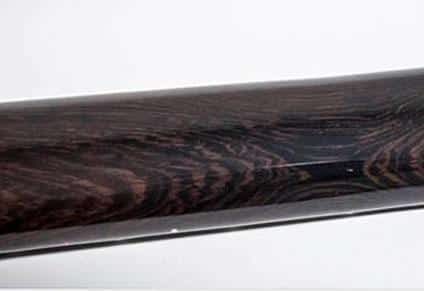
The heart of any stringed instrument like a guitar lies in the wood used. And having played guitars with different wood types, including the much-loved maple, mahogany, and now wenge, my personal encounters with each have been quite distinctive. These experiences have deepened my understanding and appreciation for the unique qualities each wood type brings.
As a luthier myself, I have had the opportunity to shape, carve, and feel the grain of different guitar necks. My all wenge neck experience has been a revelation. This wood, native to Africa, has a unique tonal quality that I fell in love with instantly. It’s the reason I’ve been advocating for its broader use amidst luthiers in my network.
So, the natural question arising is, Is there an ideal situation to show off the beauty and versatility of a wenge guitar neck? Let’s find out.
Wenge neck guitars are perfect for those looking to explore new musical possibilities. Its unique combination of hardness and weight imparts a clear, punchy tone that stands out in a mix. It’s indeed the perfect choice for lead guitarists who want to make a strong presence felt in ensemble setups. Based on luthier advice on wenge necks, this wood sparkles with potential when used on boutique jazz guitars, where its balanced tonal nature allows the complex melodies to shine through.
From my experience, live performances and recording sessions in acoustically treated studios are where a wenge neck guitar truly stands out. The natural resonance of the wood, amplified by the acoustics, stands testament to the uniqueness and versatility of wenge.
In conclusion, as per luthier advice and my own experiences, wenge necks shine brightly when used in ensemble play, live performances, or studio recording sessions, especially for lead parts encapsulating complex melodies or jazz music.
How to Care for Wenge Guitar Necks
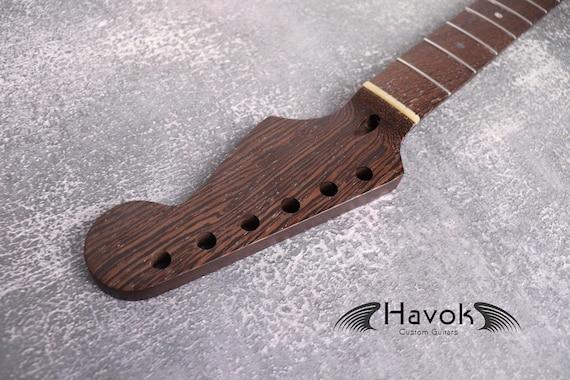
After understanding the unique traits of wenge wood in guitar necks, it’s time to shift our focus to its preservation. Taking care of your precious wenge guitar neck doesn’t have to be an uphill battle. Interested to learn the tricks of the trade? As a luthier and guitar enthusiast, I’m eager to share my insights on how to care for wenge necks, stemming from my love for this splendid wood kind and years of first-hand experience.
First and foremost, finishing a wenge neck is a critical step. The open grain structure of wenge lends itself to a somewhat coarse surface feel. Conversely, this gives the wood a natural grip, beloved by many guitarists. However, you may prefer to smooth it out slightly. Applying a finishing oil can provide a fine balance, preserving the grip, while also offering a smoother experience.
Moving on to your routine wenge neck care, there are a few vital points to remember. The uniqueness of wenge comes from its wonderful balance of density and resilience, making it reasonably resistant to cracks and warping. But we, the guitar caretakers, must do our part as well. Preventing excessive dryness is key. Consider maintaining moderate humidity levels, as drastic changes can harm the wood’s integrity. Keep in mind, though, a dry fretboard can be rehydrated using lemon oil, applied sparingly over time.
As enthralled as I am by the nuanced world of wenge guitar necks, I can readily confess that the care they require is less daunting than it may initially seem. With a grounded understanding and a touch of discipline, you too can ensure your wenge neck’s longevity and performance remain at their peak.
Comparisons with Other Wood Types
Wenge vs Maple Neck
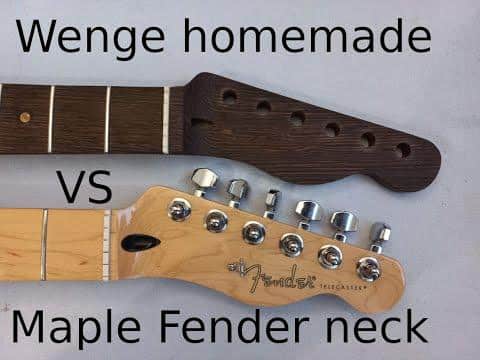
Approaching the wenge vs maple neck comparison, it’s paramount to note both woods bring uniquely appealing characteristics to the table. As we explore further into this comparison, we’ll delve into the tactile and tonal idiosyncrasies of each wood and how they differentiate in their contribution to a guitar’s makeup.
Maple necks, more common in the guitar industry, offer a smooth, fast response on the fretboard, perfect for quick and intricate play styles. The tone of a maple neck adds brightness and clarity, enhancing upper harmonic content. Maple’s hardness affords durability and long life, a factor many musicians appreciate. Think Telecaster twang!
Conversely, a wenge fretboard, although not as widely used, comes with an allure of its own. Recognizable by its darker color, wenge feels less slick, providing a satiny grip that many find appealing. Sound-wise, wenge is renowned for its balanced tone, lending a rich flavor to the mid-range frequencies while maintaining ample bass and treble content. This translates to a more natural, ‘organic’ tone, resonating well within more rootsy musical spaces.
In essence, the choice between wenge vs maple neck falls to personal preference, shaped by your playing style, and the tonal qualities you hold dear. Both woods, different yet equally representative of quality and character, aid in crafting a guitar’s distinctive voice and feel.
Wenge vs Mahogany Neck
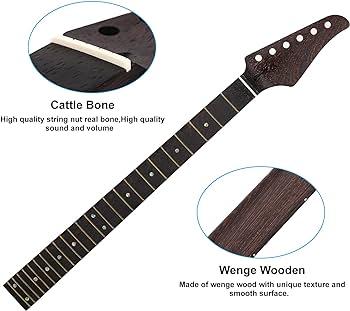
As we delve into comparisons with other woods in guitar craftsmanship, understanding the differences between a wenge vs mahogany neck is beneficial. These two distinctive types of wood both offer unique acoustic properties. However, they can impact a guitar’s tone differently due to their varied characteristics.
Given my extensive expertise with guitar-making materials, wenge, known for its heavy weight and high density, produces a more responsive, clear, and brighter tone with significant sustain. Its sound can be described as articulate, which fits well into complex musical arrangements, allowing each note to shine through. Comparatively, mahogany, while less dense, lends a warm, full-bodied resonance, rich in mid-range overtones. This results in a softer and more blended tonality that beautifully complements blues, jazz, or folk genres.
I’ve personally witnessed how these acoustic properties of wenge wood can also affect sustain and attack. High-density woods like wenge tend to provide longer sustain and sharper attack, making it preferable for rock or any music demanding percussive playing. Mahogany, on the other hand, due to its softer nature, delivers shorter sustain and a smooth attack, perfect for strumming and finger-picking styles.
Whether choosing wenge or mahogany, both woods have their unique attributes and tonal contributions. The choice heavily relies on your preferred music style and the tone you desire from your guitar.
Experiences and Reviews of Wenge Neck
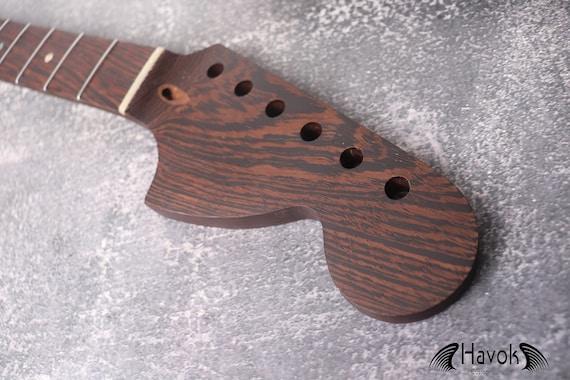
Throughout my time as a musician, I’ve been fortunate enough to work extensively with wenge guitar necks. They’ve long been my go-to for their unique tonal properties and stability. That experience gives me some practical insights to share, beyond just theory and assumptions. Apart from my perspective, I’ve also been keen to understand what my fellow musicians think of wenge necks, leading me to garner a series of wenge neck reviews.
Ever wondered what renowned musicians think about wenge guitar necks? You might be equally enthralled by their experiences. From these interactions, the collective opinion is that a wenge neck offers a distinct sound character that veers towards a denser, warmer tone. The unique resonance it offers is something many musicians are appreciative of, despite the rarity of its usage.
Getting my hands on my first wenge neck was a revelation – the tangible difference in tone color, the feel under my fingers, and the overall balance were undeniably different from the other wooden necks I’d played. Surprisingly, I found it responsive to my touch, much more organic than say maple or mahogany.
A recent conversation with a seasoned guitarist, enamored with his new wenge neck, highlighted its advantage in terms of density. He passionately explained how he felt the inherent strength and density of wenge provided a sturdier base for the strings, offering an enhanced sustain and overall resonance.
In the grander scheme, these insights do fascinate, but individual tastes matter too. After all, the magic of music lies in these idiosyncrasies. So, if you’re intrigued by the veracity of these wenge neck reviews, the best proof of the pudding is in the eating. Experience it direct and you may very well join the league of those falling for the charismatic allure of the wenge neck.
FAQs
What is a Wenge guitar neck?
A Wenge guitar neck is a type of guitar neck made from the Wenge wood, a dense and durable hardwood found in Africa. Wenge guitar necks are notorious for their unique properties and are sought after by guitarists for their bright tone and lasting sustain.
What are the properties of a Wenge guitar neck?
Wenge guitar necks boast a variety of distinct properties. They are durable, dependable, and resistant to warping. They have a coarse texture, straight grain, and distinctive dark brown to black coloration. All these traits make them both an aesthetically pleasing and functionally exceptional choice among guitarists.
What is the tone quality of a Wenge guitar neck?
In terms of tonal quality, Wenge is known for its bright, clear tone with good sustain. Its density contributes to a quick response, sharp note definition, and pronounced midrange. Its ability to maintain note clarity, even during rapid play, sets it apart from other woods.
How does a Wenge guitar neck compare with other wood types?
Compared to other woods, Wenge is a comparatively heavy, dense, and hard wood that tends to produce a brighter tone with longer sustain. It is usually considered mid-way between rosewood and maple necks in terms of brightness and warmth. Unlike rosewood, which produces a warmer tone, or maple, which is often brighter, wenge combines properties of both, thus providing a balanced tonal profile.
Conclusion
So, are you ready to resonate with the entrancing world of wenge guitar necks? Let’s recap the main points. Wenge wood is highly durable and stable, often chosen for its distinct aesthetic appeal and tonal quality. Utilized properly, a wenge guitar neck can provide your instrument with a striking look and a resonant, balanced tone.
Choosing the right guitar neck is a step in the right direction, enhancing tactility, playability, and sound quality. As you embark on your quest for the perfect sound, explore different wood types and their tonal effects and remember, wenge holds its own against popular choices like maple and mahogany.
In the vast landscape of guitar crafting, knowing when and where to use wenge necks, and how to care for them can make all the difference. This knowledge, paired with comparative insights, will guide your decision making, ensuring the longevity and optimal performance of your instrument.
As we wrap up, remember that instrument sound depends on more than just the neck. I hope that my insights about wenge guitar necks have proven useful in your journey towards musical excellence. Here’s to finding the perfect resonance for your strum!
